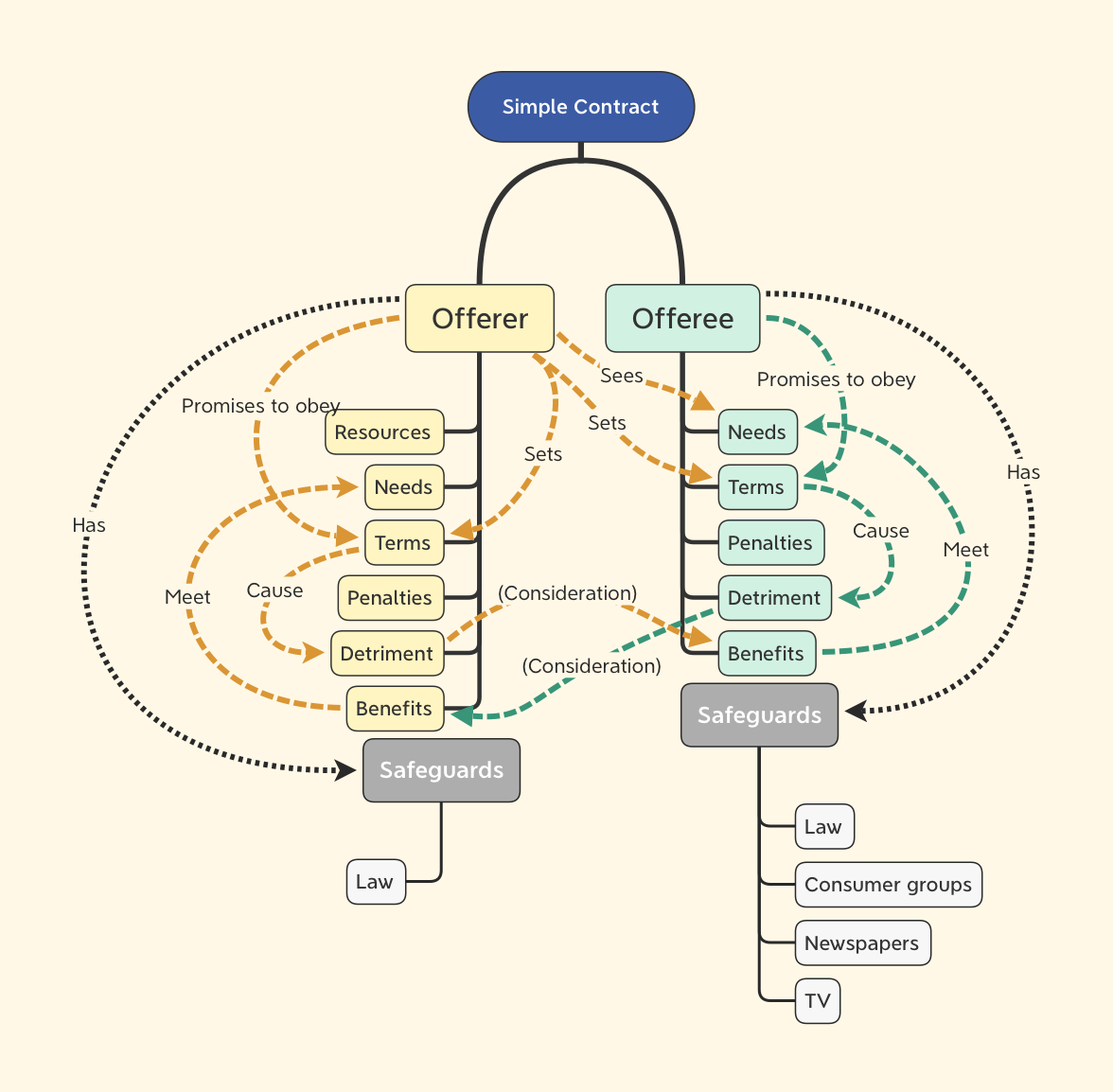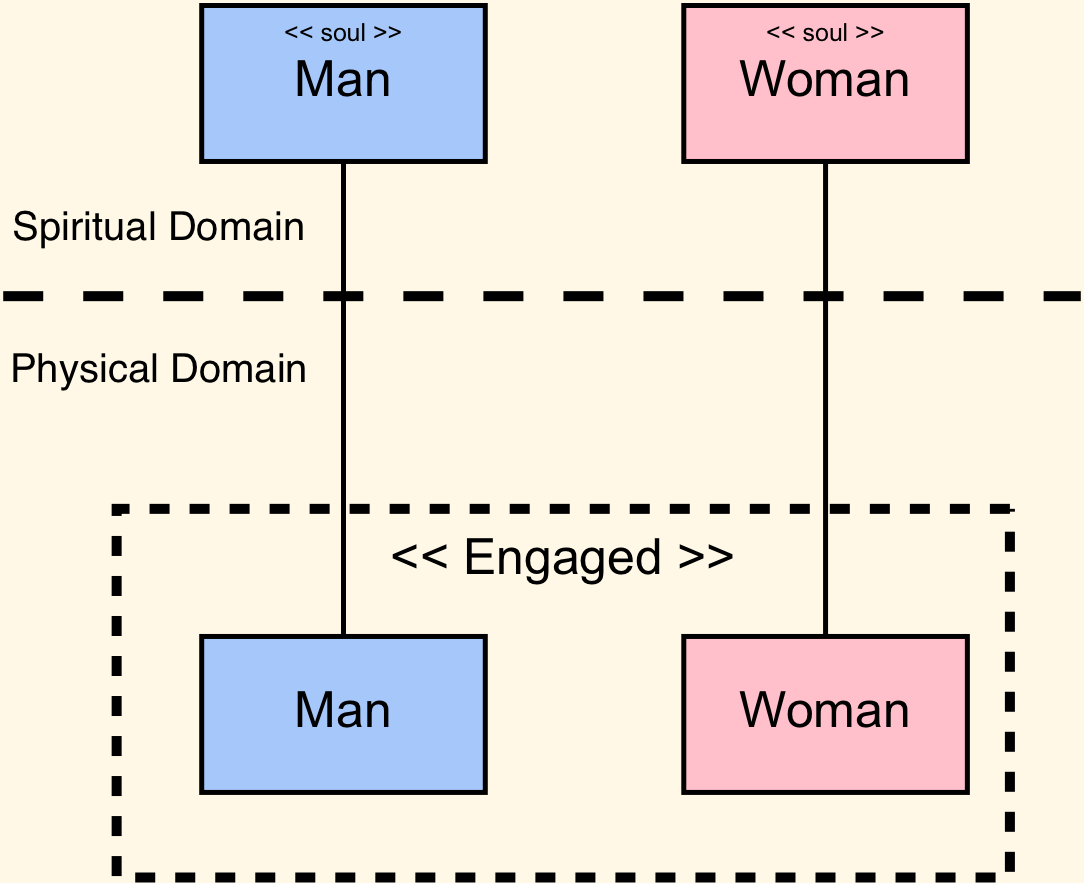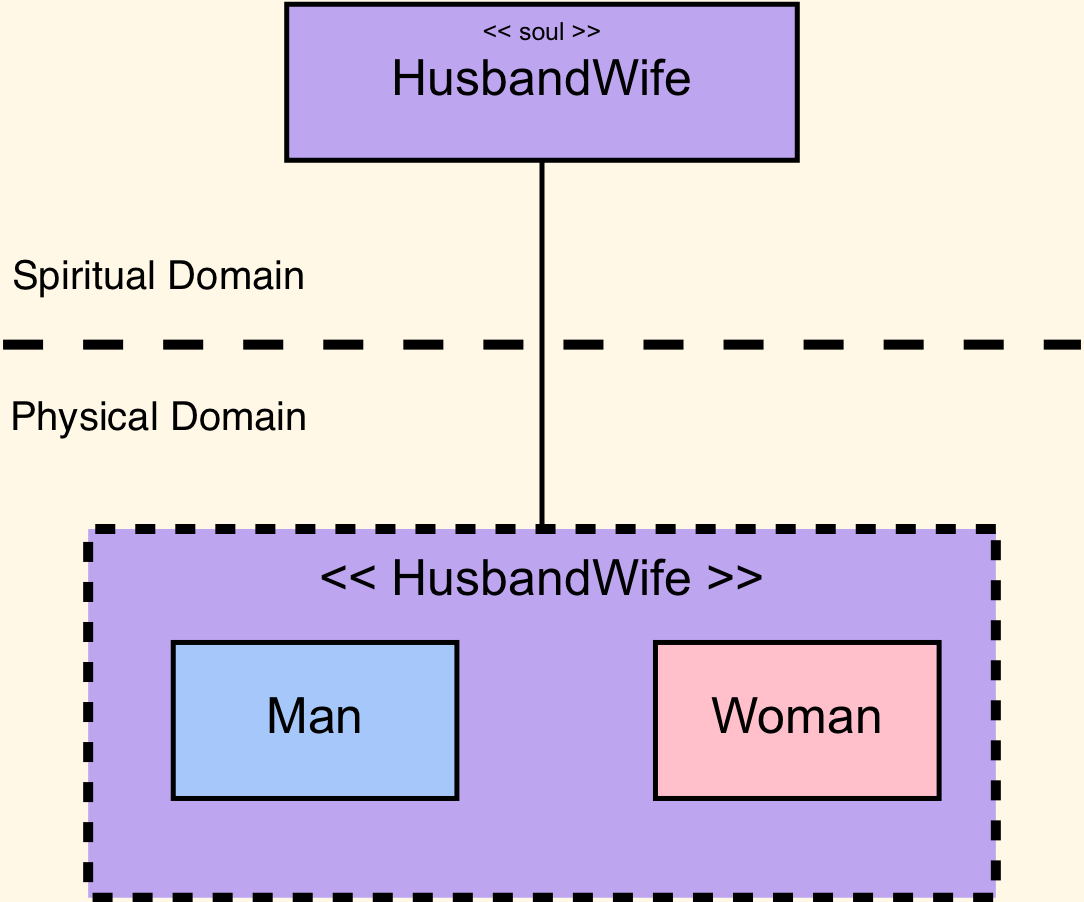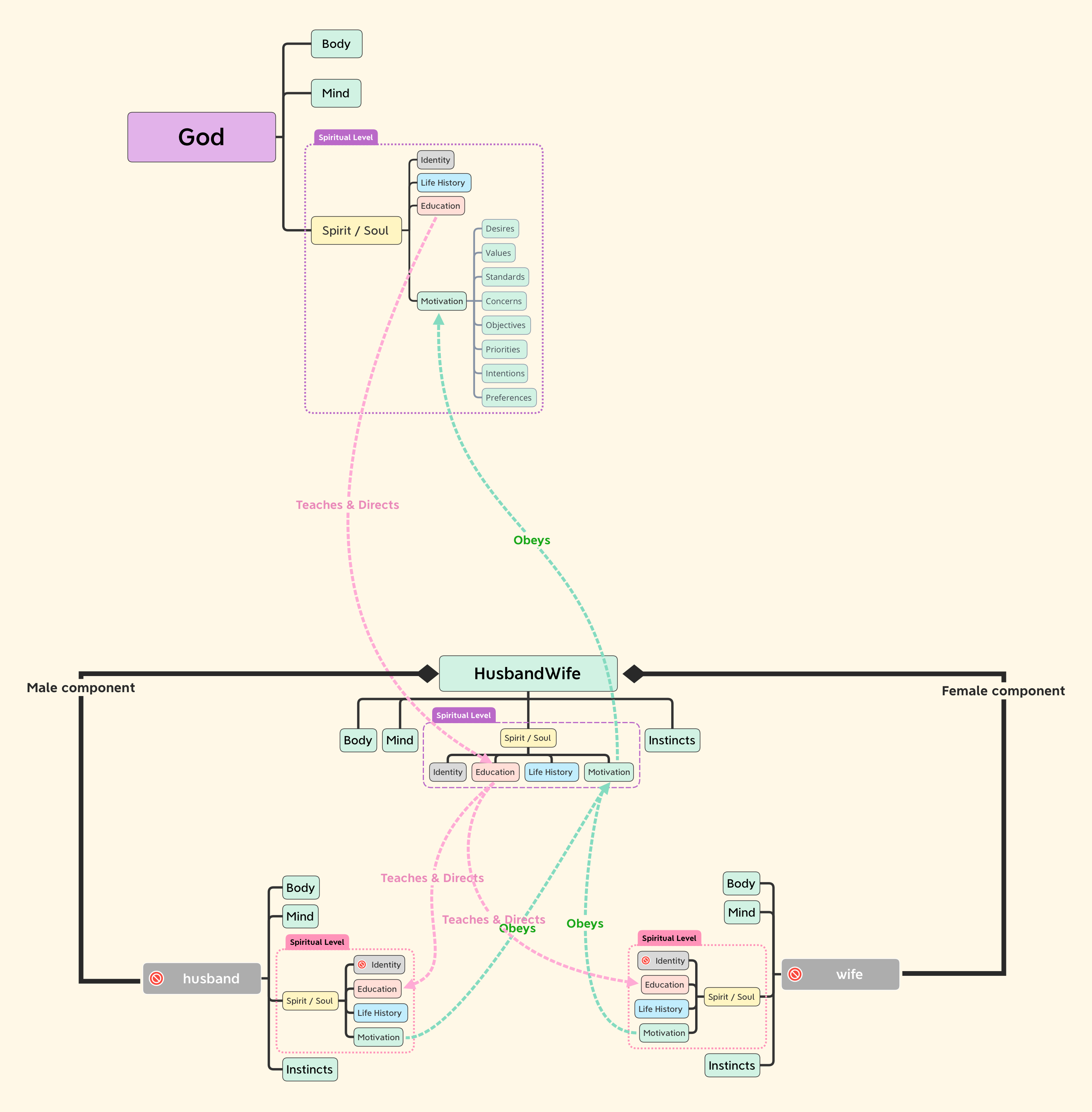 |
Index
|
Index

People using VPN for computer, smartphone with VPN sign. Users protecting personal data with VPN service. Concept of virtual private network, cyber security, data protection.

Fig.1: Schematic of simple secular contract.
[Essay: Safeguards in secular contracts.]
Infringement of covenant safeguards will open the door to obtaining redress.
[Essay: Redress in secular contracts.]
[Essay: Obtaining redress in secular contracts tends to favour the wealthy.]
One might think that things would be easier and better as regards Covenant safeguards and redress. Sadly, however, this is not the case. The dangers are off the scale. The dangers are insidious, and may creep up when least expected. And awareness may come when redress is no longer possible, when 'if only' will be the refrain which haunts the soul throughout an eternity in Hell.
Since the Covenant and each of its components are contracts, all contractual constraints will apply.
Jesus is included in the Covenant. See the Representation of Jesus.
The use of contracts ensures fairness, and the protection of the parties.
[Essay: Covenant safeguards protecting the Flock.]
See also Security
We await the replacement of the false shepherds with shepherds after God's own heart.
A vow to God is an unsolicited solemn promise made unilaterally. It is therefore totally different to a commitment to a contract offered by God.
[Essay: Vows vs promises vs contracts.]
Under the Mosaic Contract, some vows made to God could be cancelled under certain conditions.
Recall that young people who are growing to maturity are to be protected by their parents against making rash or inappropriate vows (see following).
Jesus offers sound advice with regard to vows:
33 "Again, you have heard that it was said to the people long ago, 'Do not break your oath, but keep the oaths you have made to the Lord.' 34 But I tell you, Do not swear at all: either by heaven, for it is God's throne; 35 or by the earth, for it is his footstool; or by Jerusalem, for it is the city of the Great King. 36 And do not swear by your head, for you cannot make even one hair white or black. 37 Simply let your 'Yes' be 'Yes,' and your 'No,' 'No'; anything beyond this comes from the evil one.” (Matthew 5:33-37 NIV)
To summarise Jesus' words, it is better to avoid vows altogether. If one's word is good, then one can avoid any necessity for vows.
Obedience can keep one safe! But note that the safeguards with regard to vows is dependent on the sound knowledge and understanding of others - which is not always the case, and therefore not to be taken for granted. It is by avoiding vows and promises altogether, that one does away with the need to rely on the integrity of others.
The precedent set here will apply equally to a son or daughter.
If a woman makes a vow to the LORD or assumes an obligation while still in her father's household by reason of her youth, 5 and her father learns of her vow or her self-imposed obligation and offers no objection, all her vows shall stand and every self-imposed obligation shall stand. 6 But if her father restrains her on the day he finds out, none of her vows or self-imposed obligations shall stand; and the LORD will forgive her, since her father restrained her. (Numbers 30:4-6 (Tanakh))
[Some young people, because of their youth and inexperience, may make a vow to God which will commit them to some course of action which would prove harmful in the long-run. Rash or premature vows such as these would go against God's wishes.]
Since she is living at home, she falls under the care and protection of her parents.
She need only accept her parent's restraint in order to find forgiveness for her actions.But if her father restrains her on the day he finds out, none of her vows or self-imposed obligations shall stand; and the LORD will forgive her, since her father restrained her. (Numbers 30:6 (Tanakh))
By implication, if she overrides her parent's objections, then she will remain bound by the vows she has taken.
[Essay: Assertion of teenage independence and rejection of a parent's restraint.]
On the other hand, if her parents learn of these promises and offer no objection, then she will remain bound by her vows. Having reached the Age of Discretion she is accountable for her actions.
In this way the Lord God seeks to help, protect, and guide those who are growing up. Needless to say, a young son living at home will be offered the same protection.
The young-person-safeguard will require sound knowledge and understanding on the part of the parents! Which is not always a given:
19 Amon was twenty-two years old when he became king, and he reigned two years in Jerusalem; his mother's name was Meshullemeth daughter of Haruz of Jotbah. 20 He did what was displeasing to the LORD, as his father Manasseh had done. 21 He walked in all the ways of his father, worshiping the fetishes which his father had worshiped and bowing down to them. 22 He forsook the LORD, the God of his fathers, and did not follow the way of the LORD.
23 Amon's courtiers conspired against him; and they killed the king in his palace. 24 But the people of the land put to death all who had conspired against King Amon, and the people of the land made his son Josiah king in his stead. 25 The other events of Amon's reign and his actions are recorded in the Annals of the Kings of Judah. 26 He was buried in his tomb in the garden of Uzza; and his son Josiah succeeded him as king.
2 1 Josiah was eight years old when he became king, and he reigned thirty-one years in Jerusalem. His mother's name was Jedidah daughter of Adaiah of Bozkath. 2 He did what was pleasing to the LORD and he followed all the ways of his ancestor David; he did not deviate to the right or to the left. (2 Kings 21:19 - 22:2 (Tanakh))
King Amon, Josiah7Cs father, did what was evil in the sight of the Lord; yet, despite the handicap, Josiah7C followed the example of David10C, doing what was right in the sight of the Lord.

Dr Paul Tournier discusses the problems associated with premature abdication and premature renunciation (A Place for You).
- encourages the premature renunciation of marriage, when what is required is discussion with the Lord in order to ascertain His wishes in the matter. Discuss.]32 I would like you to be free from concern. An unmarried man is concerned about the Lord's affairs---how he can please the Lord. 33 But a married man is concerned about the affairs of this world---how he can please his wife--- 34 and his interests are divided. An unmarried woman or virgin is concerned about the Lord's affairs: Her aim is to be devoted to the Lord in both body and spirit. But a married woman is concerned about the affairs of this world---how she can please her husband. (1 Corinthians 7:32-34 NIV)
It is important to consider the state of marriage as it existed in the Garden Annex, for this is the state to which Jesus returned it when He cancelled the divorce concession. Here, in the original state of marriage, there is equality between husband and wife: the wife is not subservient to her husband. The precedents set here will apply equally to husband or wife.
7 If she should marry while her vow or the commitment to which she bound herself is still in force, 8 and her husband learns of it and offers no objection on the day he finds out, her vows shall stand and her self-imposed obligations shall stand. 9 But if her husband restrains her on the day that he learns of it, he thereby annuls her vow which was in force or the commitment to which she bound herself; and the LORD will forgive her. (Numbers 30:7-9 (Tanakh))
Before marriage, an engaged couple, although socially an item', are separate individuals:

Fig.2: Engaged couple
But with marriage, they will no longer exist as separate individuals, for they will become one person at both the Physical and Spiritual Levels:

Fig.3: A married 'couple' appear to the world to be two people; in reality, they are but one person.
Either person, prior to marriage, may have made vows or commitments which the other would find unacceptable.
Since they are to become one person, any problems with individual vows need to be brought before the Lord and discussed with Him. If these differences aren't resolved to the Lord's satisfaction, then division and conflict may ensue.
Once they are married, any vows or commitments made by one spouse can be cancelled by the other. The only stipulation is that this must be done promptly as soon as the matter becomes known. To be aware of the other's promises and to do nothing means that those promises must stand - because silence gives assent.
[Verb (be widowed): become a widow or widower
Adjective: widowed (Dictionary of English)]
10 The vow of a widow or of a divorced woman, however, whatever she has imposed on herself, shall be binding upon her.— (Numbers 30:10 (Tanakh))
The vows and commitments of those who have lost their spouse or those who are divorced, will stand.

Bear in mind that, from the time of Moses until Jesus, divorce was permitted because of the hardness of men's hearts. Therefore, this skewed the perception and the state of marriage.
Jesus restored the state of marriage to what it was in the Garden Annex:
4 "Haven't you read," he replied, "that at the beginning the Creator 'made them male and female,' 5 and said, 'For this reason a man will leave his father and mother and be united to his wife, and the two will become one flesh' ? 6 So they are no longer two, but one. Therefore what God has joined together, let man not separate."
7 "Why then," they asked, "did Moses command that a man give his wife a certificate of divorce and send her away?"
8 Jesus replied, "Moses permitted you to divorce your wives because your hearts were hard. But it was not this way from the beginning. 9 I tell you that anyone who divorces his wife, except for marital unfaithfulness, and marries another woman commits adultery." (Matthew 19:4-9 NIV)
Bear in mind, too, that Peter offered unconditional support to Paul's teaching:1 Wives, in the same way submit yourselves to your own husbands so that, if any of them do not believe the word, they may be won over without words by the behavior of their wives, 2 when they see the purity and reverence of your lives. 3 Your beauty should not come from outward adornment, such as elaborate hairstyles and the wearing of gold jewelry or fine clothes. 4 Rather, it should be that of your inner self, the unfading beauty of a gentle and quiet spirit, which is of great worth in God's sight. 5 For this is the way the holy women of the past who put their hope in God used to adorn themselves. They submitted themselves to their own husbands, 6 like Sarah, who obeyed Abraham and called him her lord. You are her daughters if you do what is right and do not give way to fear. (1 Peter 3:1-6 NIV)
15 Bear in mind that our Lord's patience means salvation, just as our dear brother Paul also wrote you with the wisdom that God gave him. 16 He writes the same way in all his letters, speaking in them of these matters. His letters contain some things that are hard to understand, which ignorant and unstable people distort, as they do the other Scriptures, to their own destruction. (2 Peter 3:15-16 NIV)
[Essay: Covenant-marriage transcends death.]
[Dissertation: Paul's corruption of the Covenant and the Twelve.]
11 So, too, if, while in her husband's household, she makes a vow or imposes an obligation on herself by oath, 12 and her husband learns of it, yet offers no objection—thus failing to restrain her—all her vows shall stand and all her self-imposed obligations shall stand. 13 But if her husband does annul them on the day he finds out, then nothing that has crossed her lips shall stand, whether vows or self-imposed obligations. Her husband has annulled them, and the LORD will forgive her. 14 Every vow and every sworn obligation of self-denial may be upheld by her husband or annulled by her husband. 15 If her husband offers no objection from that day to the next, he has upheld all the vows or obligations she has assumed: he has upheld them by offering no objection on the day he found out. 16 But if he annuls them after the day he finds out, he shall bear her guilt. (Numbers 30:11-16 (Tanakh))
Recall that - within the Covenant - husband and wife are one person, and that it is the HusbandWife soul which will carry across from this life to be reunited in the next: the unity of marriage.
[Essay: The HusbandWife soul spans physical death.]
For more detail of marriage and its relationship to God, get the microscope out and zoom in:

Fig.4: Unity of marriage.
There is neither husband or wife - only 'HusbandWife'.
[Assignment: Redraw Fig.4 with regard to the Trinity.]
[Dissertation: The Unity of Marriage. To what extent is this the paradigm for community within the Covenant?]
Because a husband and wife are one person, it is necessary to ensure that there is agreement and harmony between them at the Spiritual Level. Division and conflict will only end in tears. However, if this level of unity can be achieved, then there will be Potentiation within the relationship which will lead to an enhanced yield of fruit.
If one spouse unilaterally makes a promise with which the other disagrees, then the other spouse can cancel the promise as soon as it becomes known. If time passes and nothing is done, then the promise will be binding, for silence gives assent. If, after time has passed, the other spouse then decides to cancel the promise, then the other spouse will bear the guilt of the one who made the promise.
The cancellation of unilateral vows within marriage is a safeguard best avoided. The need for such a safeguard reveals a hairline crack which can appear in the unity of marriage, and which must be guarded against. Prevention, as always, is better than cure. If there is to be unity at the Spiritual Level, then it will be necessary to discuss matters openly as equals; and, as one person, entering into discussion with the Lord. Furthermore, if one's word is good - and this applies just as much to HusbandWife as it does to an individual - then it does away with the need for vows.
An engaged couple may be united in their intent; but they will remain as separate entities, unaligned prior to their marriage.
If one or the other has made vows to God, then any attempt to cancel them prior to marriage will incur guilt. Since they are yet to be married, neither can cancel the other's vows made to God. Nonetheless, they can take proactive action prior to the marriage, by openly discussing their differences and conformities with each other, and with the Lord.
Thus prepared, following their marriage, each can cancel the other's vows, ensuring the prompt alignment of the souls as HusbandWife at the Spiritual Level.
forgiveness may be found in two way. Either:
The functioning of the Rescue Contract may be found here.
It is here - in safeguarding vulnerable family members - that we can find the Lord's depth of understanding and care.
Scripture teaches that a righteous person can save only themself:
12 The word of the LORD came to me: 13 O mortal, if a land were to sin against Me and commit a trespass, and I stretched out My hand against it and broke its staff of bread, and sent famine against it and cut off man and beast from it, 14 even if these three men — Noah, Daniel, and Job — should be in it, they would by their righteousness save only themselves — declares the Lord GOD. 15 Or, if I were to send wild beasts to roam the land and they depopulated it, and it became a desolation with none passing through it because of the beasts, 16 as I live — declares the Lord GOD — those three men in it would save neither sons nor daughters; they alone would be saved, but the land would become a desolation. 17 Or, if I were to bring the sword upon that land and say, “Let a sword sweep through the land so that I may cut off from it man and beast," 18 if those three men should be in it, as I live — declares the Lord GOD — they would save neither sons nor daughters, but they alone would be saved. 19 Or, if I let loose a pestilence against that land, and poured out My fury upon it in blood, cutting off from it man and beast, 20 should Noah, Daniel, and Job be in it, as I live — declares the Lord GOD—they would save neither son nor daughter; they would save themselves alone by their righteousness. (Ezekiel 14:12-20 (Tanakh))
Yet, when we look at the Covenant family and the forgiveness of ill-advised vows, we see a different side to the Lord God; and a different insight not only into the nature of forgiveness, but also into the heart and mind of the Lord God Himself. We discover the depth of His knowledge and care and attention to detail...
With regard to vows within the context of the Covenant family, the prompt actions of a knowledgeable parent can deliver a vulnerable person within the household from the consequences of any vows they may have made prematurely. The vulnerable person - having reached the Age of Discretion - remains accountable for their actions. Such a person, having made inappropriate vows to God, may yet find forgiveness through the prompt intervention of a parent:
If a woman makes a vow to the LORD or assumes an obligation while still in her father's household by reason of her youth, 5 and her father learns of her vow or her self-imposed obligation and offers no objection, all her vows shall stand and every self-imposed obligation shall stand. 6 But if her father restrains her on the day he finds out, none of her vows or self-imposed obligations shall stand; and the LORD will forgive her, since her father restrained her. (Numbers 30:4-6 (Tanakh))
Note that there is no formal triggering of the penalty clause of the Primary-Contract followed by the formal action required by the current Rescue Contract. All that this vulnerable young woman need do is to accept her parent's prompt restraint, and she will receive the Lord's forgiveness. Note, too, that such intervention will only be effective within the context of the Covenant.
It goes without saying that what applies to the young daughter applies equally to a young son; and that the ill-advised vows can be cancelled by either parent
[Dissertation: Those who, on reaching the Age of Discretion, and who have chosen to dwell with the Lord, will continue to remain vulnerable...]
'Enslavement' is not a 'nice' word! Nevertheless, it accurately portrays what has taken place either in new-covenant churches or in the synagogues of desolation. It's time to stop hiding behind the euphenisms and to call it like it really is.
Paul, on a woman's place in church and home:
33 ... As in all the congregations of the saints, 34 women should remain silent in the churches. They are not allowed to speak, but must be in submission, as the Law says. 35 If they want to inquire about something, they should ask their own husbands at home; for it is disgraceful for a woman to speak in the church. (1 Corinthians 14:33b-35 NIV)
Peter endorses Paul's evil:
1 Wives, in the same way, accept the authority of your husbands, so that, even if some of them do not obey the word, they may be won over without a word by their wives' conduct, 2 when they see the purity and reverence of your lives. 3 Do not adorn yourselves outwardly by braiding your hair, and by wearing gold ornaments or fine clothing; 4 rather, let your adornment be the inner self with the lasting beauty of a gentle and quiet spirit, which is very precious in God's sight. 5 It was in this way long ago that the holy women who hoped in God used to adorn themselves by accepting the authority of their husbands. 6 Thus Sarah obeyed Abraham and called him lord. You have become her daughters as long as you do what is good and never let fears alarm you. (1 Peter 3:1-6 NRSV)
[Dissertation: The enslavement of women in Judeo-Christian synagogues and churches.]
The topic continues here
Under secular law, victims of bogus contracts may find redress within the courts, the media, or consumer groups. Not so in the case of victims of covenant fraud.
David's Tent lies in ruins, having been defiled and razed to the ground by the House of Desolation, the unknown writer to the Hebrews, Paul and all his followers of the new-covenant, and the destruction of the Temmple in 70 CE, rendering it unenforceable at the Physical Level. The Law is enforceable at the Spiritual Level by the Lord, although it remains unenforceable at the Physical Level. The Covenant has been shifted entirely to the Spiritual Level by Jesus and so lacks the infrastructure necessary to pursue claims in the Covenant Law courts on Earth.
How can those who have been wronged by corrupt church leadership find redress? The outlook is bleak indeed! Jesus said:
13-14 "Woe to you, teachers of the law and Pharisees, you hypocrites! You shut the kingdom of heaven in men's faces. You yourselves do not enter, nor will you let those enter who are trying to.
15 "Woe to you, teachers of the law and Pharisees, you hypocrites! You travel over land and sea to win a single convert, and when he becomes one, you make him twice as much a son of hell as you are.” (Matthew 23:13-15 NIV)
There is an element of inevitability that unless the misled convert takes action, then Death will ensue. And so Jesus advises the disciples and the people to be on their guard against corrupt church leadership:
1 Then Jesus said to the crowds and to his disciples: 2 "The teachers of the law and the Pharisees sit in Moses' seat. 3 So you must obey them and do everything they tell you. But do not do what they do, for they do not practice what they preach.” (Matthew 23:1-3 NIV)
Jesus explains the danger of discipleship: they will be thrown to the wolves:
16 I am sending you out like sheep among wolves. Therefore be as shrewd as snakes and as innocent as doves. (Matthew 10:16 NIV)
He explains further in Matthew, chapter 24.
But amidst all the turmoil and hate and persecution to which they will be subjected, perhaps the hardest to bear is betrayal within the church - and the church leadership in particular:
10 At that time many will turn away from the faith and will betray and hate each other, (Matthew 24:10 NIV)
Sadly, that betrayal is already with us, having started some two thousand years ago...

Maintaining a critical attitude to new-covenant teaching can be extremely demanding. Where can one turn for help? To be frank, we are in desperate need of those shepherds after God's heart promised within the context of the Covenant:
14 "Return, faithless people," declares the Lord, "for I am your husband. I will choose you---one from a town and two from a clan---and bring you to Zion. 15 Then I will give you shepherds after my own heart, who will lead you with knowledge and understanding.” (Jeremiah 3:14-15 NIV)
[It has been my experience that to call Paul's doctrine into question is to be accused of being somewhere between heretic and apostate, depending on one's approach. Alan]

Some points arising:
In order to survive, it is necessary to take action in this life, for it is in this life that the Book of Life is open to amendment. To hope for amendment of the Book of Life in the Court of No Appeal, is wishful thinking!
[Essay: The Lord is well-aware of the vulnerability of a new convert.]
[Essay: A comparison between the contents of the new-covenant and the contents of the Messianically updated Covenant.]
Jesus takes a proactive approach to corrupt church leadership:
[1] Then Jesus said to the crowds and to his disciples, [2] "The scribes and the Pharisees sit on Moses' seat; [3] therefore, do whatever they teach you and follow it; but do not do as they do, for they do not practice what they teach. [4] They tie up heavy burdens, hard to bear, and lay them on the shoulders of others; but they themselves are unwilling to lift a finger to move them. (Matthew 23:1-4 NRSV)
At first glance, Jesus' instruction might appear vacuous, if not fatuous! How can a layperson hope to go up against those in authority, those with 'qualifications' to back up that authority?
The answer undoubtedly lies with the Keys held by Jesus.
The fear of the Lord is the key which will unlock Zion's treasure, and which will open the door giving access to the Lord's counsel.
Those who defile the Covenant do not know the Lord. So: learn about the Lord and His Covenant at the academic level. Seek that face-to-face dialogue with the Lord which will not only deepen the personal relationship with Him, but which will encourage open and frank discussion with Him. As David states:
14 The counsel of the LORD is for those who fear Him;
to them He makes known His covenant. (Psalms 25:14 (Tanakh))
To walk this path is harder than it sounds! Some of the things you might be up against:
Truly, the rebuilding of David's Fallen Tent can't come soon enough!
It is a brutal truth that one's mistakes cannot be put right in the Court of No Appeal on the Day of Judgement. Individual entries in the Books of Record and the Book of Life (see Covenant - personal documentation.) are frozen when a person dies. These then become the evidence for the prosecution and for the defence, and determine whether a person Lives or Dies.

Those who've been misled by the church leadership, should not expect their subsequent errors to be overlooked or excused on the Day of Judgement. Jesus' warnings about treachery in the church and the need to guard against it, are compelling. So, a failure to act upon His advice amounts to culpable negligence.
Knowledge of the Covenant will expose the lies of the false prophets, such as Paul or James:
[28] For we maintain that a man is justified by faith apart from observing the law. (Romans 3:28 NIV)
[14] Is any one of you sick? He should call the elders of the church to pray over him and anoint him with oil in the name of the Lord. [15] And the prayer offered in faith will make the sick person well; the Lord will raise him up. If he has sinned, he will be forgiven. (James 5:14-15 NIV)
[Analysis: Romans 3:28.]
[Analysis: James 5:14-15]
Mistakes need to be dealt with in this life, through obedience to the Covenant and discussion with the Lord.
The Scriptures are the reference book which will - like a plumb-line - reveal error and its magnitude.
The Bible, however, is not the Scriptures (see the books of Scripture). The Bible is a deadly corruption of the Scriptures, leading many astray.
One of the Lord's findings when He reviewed the state of the Post-Eden Covenant at the time of Job, was that there was no referemce book available to guide and to help the world-wide, growing church. He therefore put a reminder in His to-do list along with the reminders of other changes which were necessary. Perhaps He could - when the time was right - incorporate all the changes into a single package?
The Lord put the Book of Teaching in place so that the flock would have a reference which could be accessed by anyone - a safeguard for the flock and those holding positions of authority. Having a personal relationship with the Lord would ensure the face-to-face discussion which would allow Him to explain and to enlarge on what was written there. It would be the face-to-face discussions with the Lord which would cut across all barriers, whether educational, class, social standing, or wealth.
Then Paul and the unknown writer to the Hebrews came along with their false doctrine; defiled and annulled the Covenant, and set up their 'new-covenant'.

At the Spiritual Level, the Lord intended the Scriptures to be a safeguard which would guide the shepherds and the flock, and help to keep them from falling into sin and error.
But those holding office corrupted the Covenant, and inserted false doctrine into the Scriptures ... which has led to the Bible we have now.
This betrayal of office, this failure to safeguard the Lord's Safeguard, will certainly not go unpunished.
See Baffling Questions.
The example of Levi:
4 Know, then, that I have sent this charge to you that My covenant with Levi may endure — said the LORD of Hosts. 5 I had with him a covenant of life and well-being, which I gave to him, and of reverence, which he showed Me. For he stood in awe of My name.
6 Proper rulings were in his mouth,
And nothing perverse was on his lips;
He served Me with complete loyalty
And held the many back from iniquity.
7 For the lips of a priest guard knowledge,
And men seek rulings from his mouth;
For he is a messenger of the LORD of Hosts.(Malachi 2:4-7 (Tanakh))
From the time of Moses' death, the Jewish leadership continued to defile the Covenant. They rejected their Messiah. Arraigned Him on bogus charges. And had Him executed on a cross at Calvary.
Because of earlier commitments, the Lord God was unable to do away with the Levitical Priesthood altogether. So He reduced them - together with the Levitical Servitors - to the ranks, where they would only be able to do the most menial tasks in the church. Henceforth, the office of Levitical Priest must bear its shame ... through this life, and then through Eternity...
As for those false shepherds, they will be replaced by shepherds after God's own heart.
This change in the priesthood in no way prevents individuals/groups from discussing matters face-to-face with the Lord.
[Essay: Face-to-face discussion with the Lord is a safeguard offered to everyone.]
Version: 17-Feb-2024